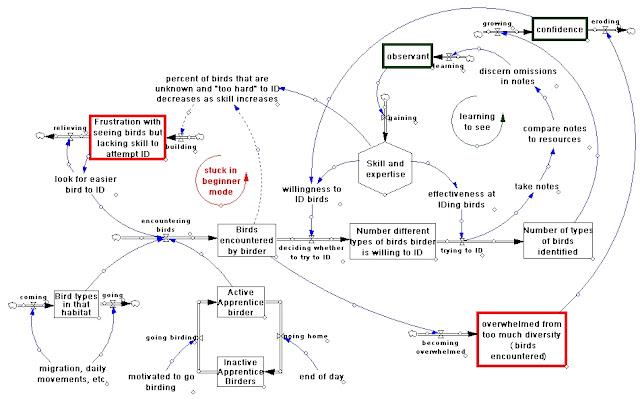Some people have questioned whether it is meaningful to separate the development of one’s self-perception as a birder from the activity of going birding. I contend that it is not only meaningful, but necessary, if one is truly interested in the notion of recruiting and retaining birders. Here is why I think that.
In 1979, a Mississippi business man named James Vardaman traveled over 160,000 miles (by plane, car, boat, bicycle, and on foot) and recorded seeing 699 species of birds in the U.S. and Canada. His adventures were chronicled in the book “Call collect: ask for birdman.” He spent tens of thousands of dollars on his quest and was accompanied by “experts” all along the way who mostly identified the species for him and provided their signed attestations that each species was indeed seen by Vardaman. Now, Mr. Vardaman certainly could identify many species on his own, but even he claimed that he wasn’t really a birder.
So, here is someone who spent hundreds of days and a ton of money in a given year looking for birds. He accumulated a huge total number of species seen. Yet, he claimed not to be a birder, and many people in the birding community agreed with him! Some people said he simply “bought” the long list of species rather than “earning” it. In other words, these people were saying that Mr. Vardaman exhibited many birding-related behaviors, but lacked some (most?) of the important characteristic traits associated with being a birder. He went birding, but he was not a birder.
Anybody with sufficient time, money, and access to experts who can identify species for them, can overcome some of the big challenges faced by Apprentices who are trying to become birders. Namely, they can by-pass the frustration that comes from encountering a high proportion of birds that they simply do not know how to identify (which can keep them “stuck in beginner mode), and they can by-pass the sense of being overwhelmed at all the diversity of bird types they encounter (see Figure 1). Note in the figure below that Apprentice Birders eventually overcome these possible identity-destroying traits (being frustrated, being overwhelmed by diversity) by developing identification skill and expertise. Even more importantly, notice in the model that frustration and the sense of being overwhelmed do not even occur as two identity-defining traits increase: (1) confidence as a birder and (2) being observant.
My point is that becoming a birder is very different from going birding and accumulating large life lists. Becoming a birder cannot be achieved by taking short cuts. Obviously, having a good birding mentor can speed-up the process and can help reduce frustration and sense of being overwhelmed that can arise for Apprentice Birders. But, becoming a birder still takes time, and hopefully, a lot of fun as the Apprentice develops the various characteristic traits of being a birder.
Go bird!
